#Picard's Last Visit with Sarek
Text
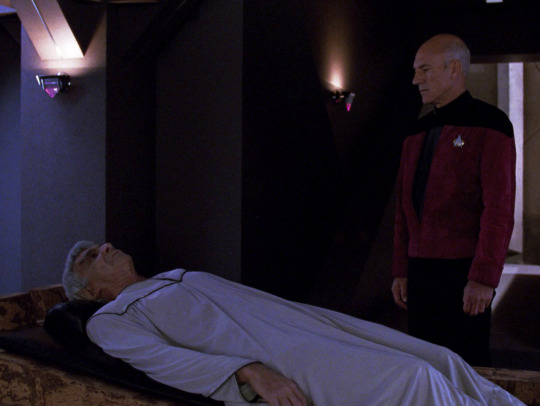
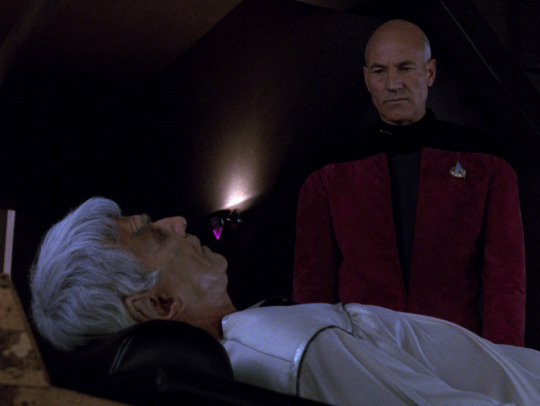
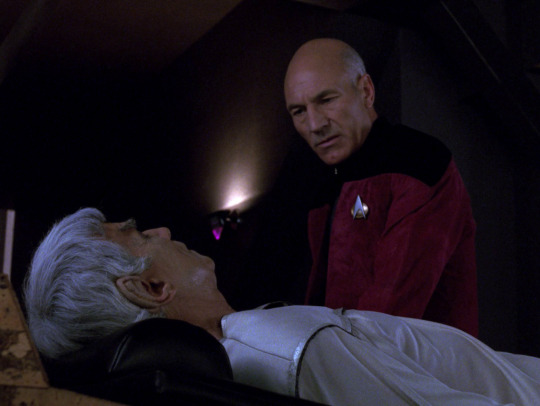
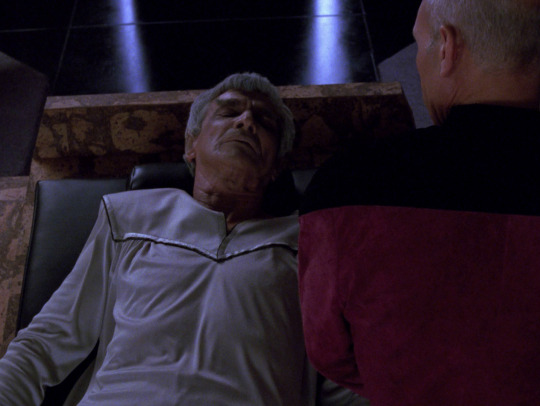
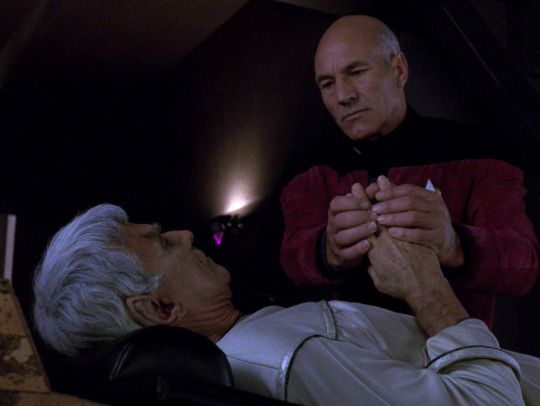
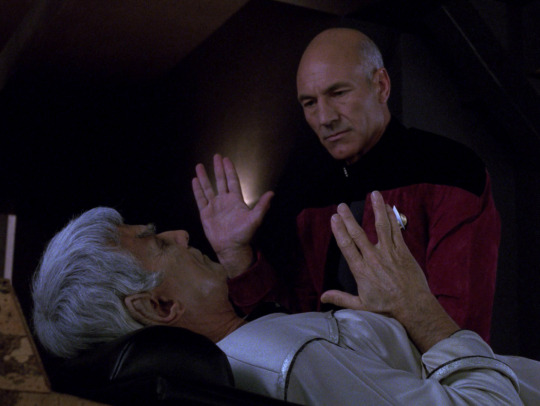
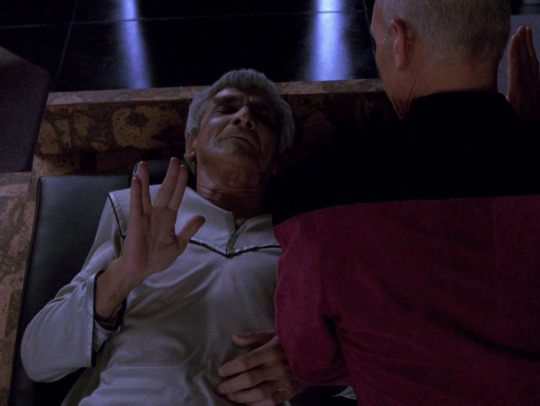
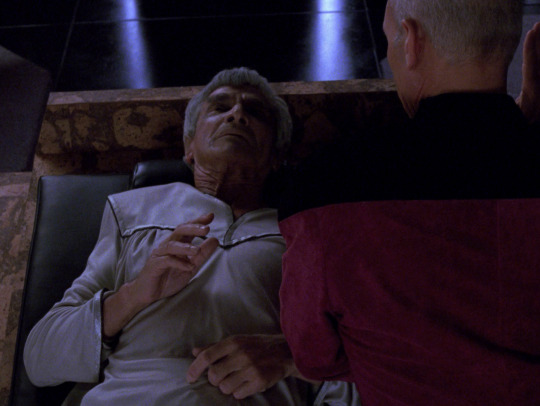
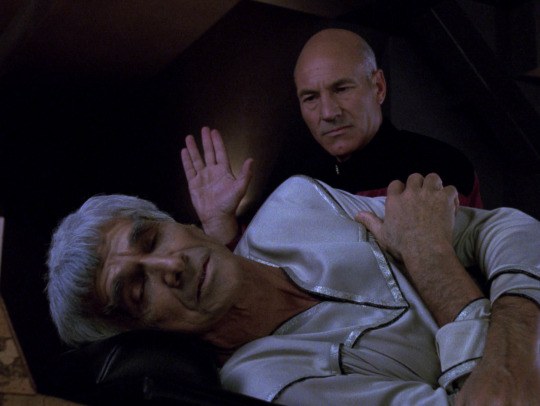
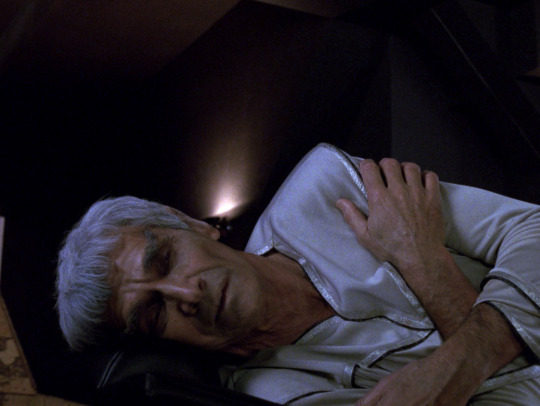
s t a r t r e k t h e n e x t g e n e r a t i o n created by gene roddenberry [unification, part I, s5ep7] 'Picard's Last Visit with Sarek'
#star trek#star trek the next generation#the next generation#gene roddenberry#tng season 5#the next generation season 5#tng unification#unification#tng unification part 1#unification part 1#lot: st tng season 5 ep 7/26 (ep 107/178)#patrick stewart#mark lenard#jean luc picard#Sarek#Picard's Last Visit with Sarek
2 notes
·
View notes
Text
So, the TNG episode Sarek. If you haven’t seen it, there are some content warnings for terminal illness and dementia, because that’s what the episode is about. And it’s real sad, and I feel like a lot of people discount it when talking about Sarek as a character, so here goes.
First, a very brief summary.
The episode starts with Picard and Riker going to greet Sarek, who is completing one last mission before retirement. He’s been working on a treaty with the Legarans for 93 years, and he’s the only one they’ll talk to. He’s accompanied by his current wife Perrin (also Human), a Human chief of staff, and a Vulcan personal assistant named Sakkath.
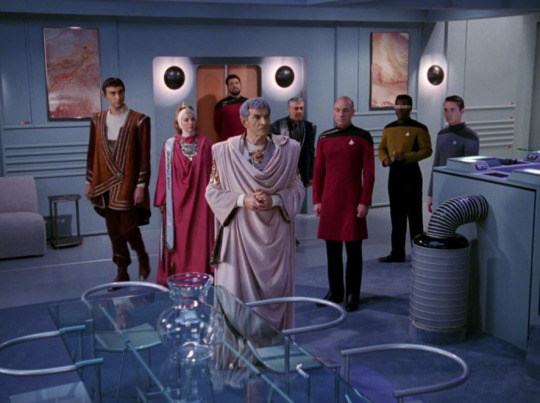
Unbeknownst to the Enterprise crew and Sarek himself at this point, the three people with Sarek all know that he has Bendii syndrome, which causes him to be unable to control his emotions. The symptoms have been slowly getting worse over the years, and the stress of this particular mission aggravates it to the point that Sakkath can’t help him. A bunch of stuff happens (which I’ll be talking about later) and Dr. Crusher and Troi figure out what’s wrong with him, and Picard has to confront him about the problem. They determine that they only way to complete the diplomatic mission is for Sarek and Picard to mind meld for a couple of hours, so Sarek will have the emotional control to complete the treaty negotiation. The negotiation is successful and Sakkath assures Picard that he’ll be able to help Sarek keep his emotions under control until they get to Vulcan. The disease is not reversible, so it will only get worse with time.

There are a few parts of this which I think are key to understanding Sarek at all times of his life, and that’s really my motivation in making this post. I think some of his actions make more sense if you understand where he’s coming from.
First of all, Sarek loves Mozart.
Sarek loves Mozart, and this is well known enough that Picard et al. have planned a Mozart concert for his visit. Not a Vulcan composer, a Human one. He’a also remarried at some point after Amanda’s death, and chose to marry another Human woman. His chief of staff is also a Human. Perrin states that he’s taken an interest in Picard’s career, yet another Human.
Sarek does not appear to consider Humans inferior to Vulcans. Maybe Sybok would like us (and Spock) to THINK he does, but that’s just not reflected in any of his actions.
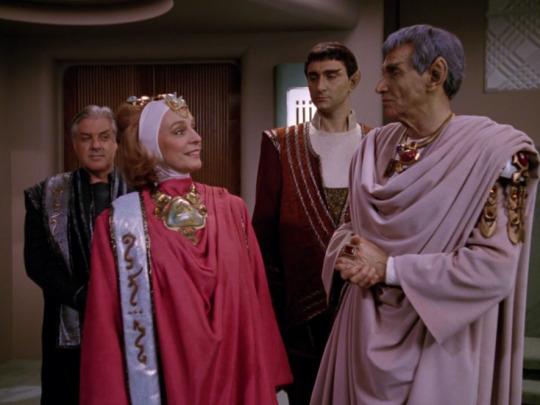
On a side note, the scene where he is moved to tears by the Mozart concert is one of the scenes that has stayed with me since I was a child. Not because it’s Sarek showing emotion--I didn’t know who he was the first time I saw this episode--but because it’s so rare for a man to show that kind of emotion on television. It’s really interesting how jarring it is to the viewer because he’s a dignified older man while also being jarring to the characters because he’s a Vulcan, and specifically he’s Sarek.
Maybe that’s why I have a different view of Sarek than people who didn’t start with TNG, because this is the scene I have always associated most with this character. Like, the way a TOS fan feels watching Pike in Discovery knowing what direction his life takes? This is how I feel about Sarek, too. This well-respected Vulcan ambassador who isn’t supposed to feel emotions, moved to tears by beautiful music... then rushed out of the concert because the others are trying to shield him from realizing that his health is failing. Just heartbreaking. And when Picard brings it up later in the episode, Sarek’s reaction is even more heartbreaking.

PICARD: But you needed his help at the concert. Or is there possibly some other logical explanation for what happened that night?
SAREK: What happened?
PICARD: I saw you crying.
SAREK: I do not cry.
PICARD: I was there I saw the tears.
SAREK: You exaggerate, Captain. I recall only one tear.
PICARD: So you were emotionally affected by the music.
SAREK: That is not possible!
PICARD: You still haven't answered my question, Sarek. Is it logical for a Vulcan to cry?
SAREK: It was late. I was fatigued. Nothing more. The Legarans trust only me. They will not meet with any other member of the Federation. I must be allowed to complete my mission! There are no other logical solutions!
And this is the part where I say that if you haven’t seen the episode recently (or ever), please, please watch it. Nothing I could say would really spoil the episode. The performances are so good, and there’s no way to express that with only the dialogue. Sarek is trying so hard throughout this confrontation to control his emotions, and you can see him deteriorating. You can see how sick he is. It’s so much worse for him than the illness he was suffering in Journey to Babel. This illness strips him of his control, which has always defined him. Look at his face when he finally admits to “one tear.”
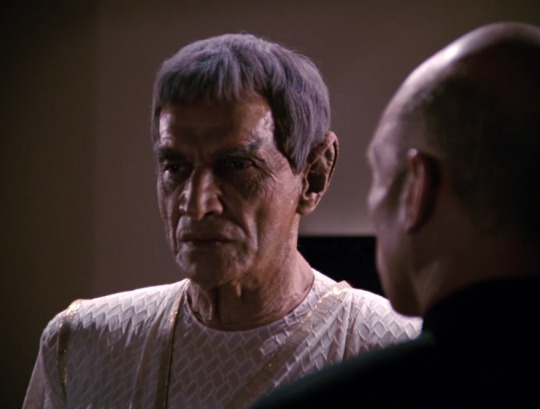
This is the point where Picard keeps pushing him until he... basically has a breakdown.
PICARD: No other logical solutions? But Ambassador, there are always other solutions. You have said so yourself many times.
SAREK: What I meant was that...
PICARD: Sarek of Vulcan would never be afraid of looking straight at something he did not want to see.
SAREK: I warn you! Your efforts to discredit me will not succeed!
PICARD: Sarek of Vulcan never confused what he wanted with the truth.
SAREK: I will not be spoken to in this manner!
PICARD: Do I hear anger in your voice?
SAREK: It would be illogical for a Vulcan to show anger! It would be illogical! Illogical! Illogical! Illogical!
I think it’s important to note that moment Sarek really starts to lose his temper completely is when Picard says that he never “confused what he wanted with the truth.”

This cuts to the heart of who Sarek is. He has always denied himself things that he wanted (as we’ll see later in the episode) in favor of what he believed was the truth, what was best for everyone.
But then he realizes that he’s become angry about this very reality, and he just breaks and it’s so sad. You can see tears in his eyes.

After this, it’s clear he can’t handle the negotiations, so Perrin begs Picard for help, and Picard goes to Sarek with her suggestion that they mind meld. The whole conversation is great, but I’m going to bold the parts that are most important to this discussion.
SAREK: A mind-meld? Between the two of us? Do you realize the dangers involved in what you are proposing, Captain?
PICARD: Yes, I do, Ambassador. But I also realize the potential benefits.
SAREK: We would be linked telepathically, sharing our thoughts, becoming in essence one mind.
PICARD: Which, for a few hours, should provide the emotional control you need. In that time, you can meet with the Legarans and conclude the treaty.
SAREK: It is a generous offer. But I must warn you that while I would gain your stability, you would experience the fierce onslaught of emotions unleashed by my condition. Vulcan emotions are extremely intense. We have learned to suppress them. No human would be able to control them. They would overwhelm you. The mind-meld can be a terrible intimacy. I cannot allow it.
PICARD: I'm aware of the risks. But it is the only logical solution.
SAREK: Your courage honors me, Captain.
Again, the text really doesn’t do justice to Mark Lenard’s performance. It’s so good. The way he catches himself becoming emotional and stumbles over words is so spot on and affecting.
Anyway, here’s his face when he says “The mind-meld can be a terrible intimacy.”
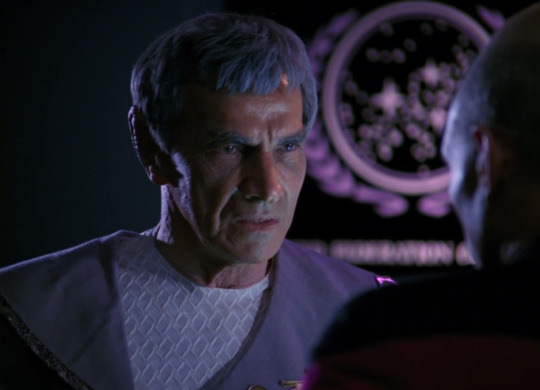
Which I highlight not only because it’s a beautiful line, but also it gives me a chance to remind you that Sarek never mind-melded with Spock.
And I think that says a lot on its own, but in the context of what Sarek is saying here, it’s really enlightening about some of his behavior. According to Sarek, Vulcans have such powerful emotions that a Human COULD NOT HANDLE THEM. So, what does that say for his half-Human son?
I don’t know, maybe all those times he pushed Spock to be more Vulcan and to maintain more control over his emotions had something to do with his concern about his VULCAN emotions harming him, not because he didn’t like the Human part of Spock. I’m not saying he did it the right way, but I think it makes it a lot more clear why he was so hard on Spock about certain things.
Then we get to the real intense part of the episode, where Picard has to take on Sarek’s emotions so he can complete the treaty. While Picard has pretty good control for a Human, we see what Sarek is actually going through that he hasn’t been expressing.
There’s a lot, so I’m going to break it down.
PICARD (as Sarek): No! It is wrong. It is wrong! A lifetime of discipline washed away, and in its place bedlam. Bedlam! I am so old. There is nothing left but dry bones and dead friends. Tired, oh so tired.
We see here, again, discipline is how he defines himself, and having it taken away is the worse possible thing for him, and the transition to talking about his age and his dead friends isn’t coincidence. Remember, he is close with Humans, and he’s over two-hundred years old, which is old even for a Vulcan. It’s not only Amanda he’s had to watch grow old and die while he kept going, but probably ever Human friend he’s had.
PICARD (as Sarek): No! This weakness disgusts me! I hate it! Where is my logic? I am betrayed by desires. I want to feel. I want to feel everything. But I am a Vulcan. I must feel nothing. Give me back my control.
CRUSHER: Jean-Luc!
PICARD (as Sarek): Perrin. Amanda. I wanted to give you so much more. I wanted to show you such tenderness. But that is not our way. Spock, Amanda, did you know? Perrin, can you know how much I love you? I do love you!
He sees his desire to feel as a weakness, and views being a Vulcan as “feeling nothing” even though we know that’s not actually true of Vulcans. He’s even said himself that Vulcans have powerful emotions that they’ve learned to suppress. Judging by every Vulcan we’ve ever seen on the show, and Sakkath in this very episode, Vulcans still feel their emotions and have to regularly maintain their suppression through meditation, etc. Meditation which Sarek has been unable to do for weeks, as mentioned early in the episode, while Sarek is deep in denial about his condition.

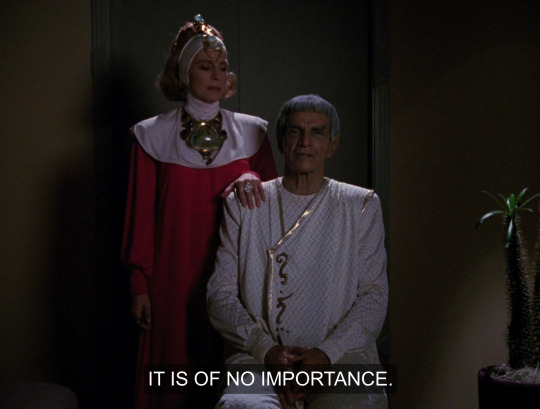
And then of course the part about Perrin, Amanda, and Spock. If Sarek never felt anything, how could he have wanted to show them tenderness? How could he have loved them this whole time? That’s where he’s always struggling. He sees being Vulcan and being unfeeling as the same thing, yet he never achieves that. He feels deeply while also needing to maintain the appearance of total lack of emotion. As he said when Picard first mentioned that he suspected Sarek of having Bendii Syndrome “I have been accused of many things in my life, never an excess of emotion.”
Lastly, even in this state, even with Picard unable to keep his emotions under control, notice that he can’t manage to direct anything AT Spock. Everything he says is to Perrin and Amanda. He says Spock’s name, but then says “Amanda, did you know?” Which can’t directly apply to Spock... Spock is still alive. He’s not able to say anything about Spock until the disease has progressed much further in the episode Unification, Part 1. There is the popular line about Spock disappearing into the mountains, but the last part of what he says often gets left out.
SAREK: No. I never knew what Spock was doing. When he was a boy, he would disappear for days into the mountains. I asked him where he had gone, what he had done, he refused to tell me. I insisted that he tell me. He would not. I forbade him to go. He ignored me. I punished him. He endured it, silently. But always he returned to the mountains. One might as well ask the river not to run. (lies down again) But secretly I admired him, the proud core of him that would not yield.
PICARD: Sarek, we're a part of each other. I know that he has caused you pain but I also know that you love him.
SAREK: Tell him, Picard.
So, if you didn’t know Sarek admires and loves his son, now you know!
And, now the last part of Picard during the mind-meld:
CRUSHER: I'm here, Jean-Luc. I'm not going anywhere.
PICARD: It's quite difficult. The anguish of the man, the despair pouring out of him, all those feelings, the regrets. I can't stop them.
(He falls, sobbing, into her arms)
PICARD: I can't stop them. I can't. I can't.
CRUSHER: Don't even try.
The way Picard describes Sarek’s feelings here is so important to me. Anguish, despair, regret. All of which are so intense that Picard sobs through this whole scene, something that is so far from how he usually behaves that it really drives home how intense these feelings are for Sarek all the time.
These feelings are not new. As Perrin said, the symptoms have been creeping up for a while, and after the mind-meld, Sarek says:
RIKER: And the Ambassador?
SAREK: I am myself again. It has been a long time.
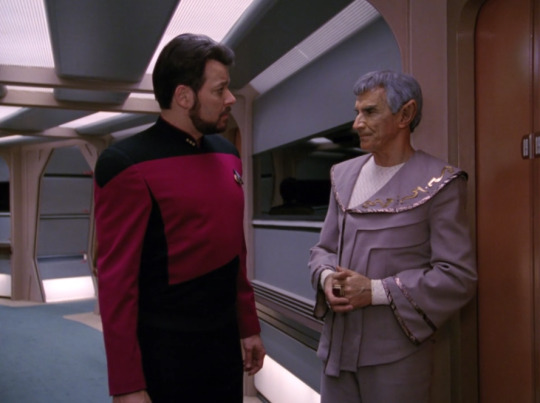
There’s no happy ending to this. No miraculous cure or surgery that fixes it. Sarek will become more ill and tormented by all the emotions he never allowed himself to feel when he was younger. There are still deep divisions between himself and Spock to the point that Perrin is angry at Spock for how he treats his father, but Sarek doesn’t seem to share that anger. Probably because he knows all of the mistakes he made with Spock. That’s part of why he has so many regrets, after all.
Basically, my point is this. I think it’s easy to look at Sarek as a Spock fan and see all of his faults. But he’s actually a really complex character who cared about his son a lot, and just didn’t always know what was best for him. He’s definitely not as unfeeling and uncaring as he can seem. It’s just an uncomfortable fact that parents aren’t perfect and can do harm no matter how much they love their children. Which is one of those themes that comes up a lot in Star Trek, but I think this iteration of it is extremely well done and moving through all of the various series and movies.
There aren’t any easy answers and barely any resolution. The relationship between Sarek and Spock never stops being tense and difficult. It’s just how things are with family sometimes, even when you care about each other.
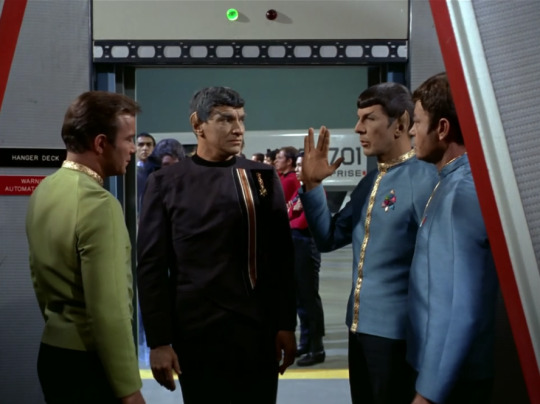
#star trek#sarek#st: tng#meta#i just feel a lot#and maybe i get a little sad that people just see him as a shitty dad
179 notes
·
View notes
Text
Generations - Part 7
First | Previous | Next
Jim examined the chess board, looking at it this way and that. There was no way around it; Spock’s play had improved significantly in the past eighty years, while Jim had only stagnated.
Spock raised an eyebrow at him. You had no chance to play in the Nexus?
Jim shot him a look.
While Jim was in the Nexus, Spock had played chess with ambassadors, Starfleet officers, and beings from all across the galaxy. Apparently, he had even succeeded at teaching a Horta to play, though it required a much larger board constructed of heat resistant material. And in return, he had learned a game of their own, though it proved difficult without the ability to corrode solid rock.
Finally, Jim made his move.
“Fascinating,” Spock said aloud and moved a piece of his own.
Jim glanced between Spock and the board. He was employing a much more forward style of play than the Vulcan strategy Jim was familiar with. But Jim could work with that. He leaned in towards Spock and advanced another piece with a mischievous smirk.
“You are as reckless as ever,” Spock remarked, but Jim could feel the warmth behind his words, and beneath it a deep longing, like nostalgia.
Jim pursed his lips in teasing annoyance as Spock continued to close his trap around Jim’s king. If there was a way out, Jim couldn’t see it.
Desperate times called for desperate measures. Spock had only a flash of warning before Jim reached out and settled his cool hand on top of Spock’s warm one. Their minds collided with a sudden rush of eager emotion. Jim rubbed circles in the back of Spock’s hand sending thrills down both their spines.
“I take this as your resignation,” Spock remarked, despite the distraction of all of Jim’s thoughts and feelings, sparking through his mind.
Jim merely grinned, but he didn’t deny it. Instead, he said, “You’ve become much more inventive. I would be impressed if it wasn’t so frustrating.”
“I do not see why you cannot be simultaneously impressed and frustrated,” Spock countered.
Jim gave him a look, and ran his hand down Spock’s long fingers in a kind of vengeance. Their minds pulled toward each other and their bond stretched open, letting their thoughts and feelings rush through. Even their very identities seemed no longer so distinct. Spock could only marvel at this mind, so familiar and vibrant with heartfelt affection, returned to him after so long. He yearned for the wholeness of a meld as much as he reflexively wanted to withdraw into meditation and process his contradictory emotions - Jim had only touched the surface and knew better than to press deeper.
At last, with a lingering touch, Jim withdrew his hand and declared, “Good game.”
Spock inclined his head. There was some suggestion of a smile around his eyes, but his expression remained flat, not that Jim was fooled.
“I am certain you will find the weakness in my strategy before long,” Spock said aloud.
Jim grinned. “I plan on it.”
“I look forward to the eventuality. Now, however,” Spock said, pushing away from the table, “if you will excuse me, it is past time I went to pay Lieutenant Commander Worf a visit.”
Jim nodded and stretched in his chair. “That’ll give me a chance to finish the book Jean-Luc lent me. I should give it back to him before we reach Earth.”
Jim felt Spock’s mixed feelings toward Captain Picard, mingled as they were his feelings for Sarek.
Jim put a sympathetic hand on Spock’s arm. “Say ‘hi’ to Mr. Worf for me.”
“I will convey your greetings,” Spock said and stood to leave.
Jim held up a hand and their fingers brushed together in a quick parting embrace, before Spock headed out the door.
Spock found Worf in the holodeck. The elaborate scenery of the Sherlock Holmes program had been replaced by a small circle of light in a black void. Worf had positioned himself in the middle of the circle, surrounded by small colorful dots flitting in and out of the darkness. Spock picked up a phaser by the entrance and made his way over to the center of the room. The arch disappeared behind him.
“Ambassador,” Worf exclaimed as Spock joined him. He hastily lowered his phaser. “Freeze program,” he ordered, and the lights froze in mid air.
“I do not intend to interrupt,” Spock said. “May I join you?”
Worf appeared skeptical, but assented, “If you want.”
Spock took his place next to Worf in the center of the circle, looking out on the scattered multi-colored lights.
“Resume program,” Worf instructed, and the dots of light resumed flickering in and out of view.
Spock watched as Worf returned to his target practice. “Captain Kirk conveys his greetings,” Spock remarked.
Worf nodded in acknowledgement, preoccupied with shooting into the swirling lights.
Spock raised his own phaser with a measured hand and fired into the darkness. The blast hit a blue dot precisely on target.
Worf glanced over at Spock in surprise. Finally, he said, a little awkwardly, “I thought Vulcans were pacifists. Why did you join Starfleet?”
Spock lowered his phaser and regarded Worf for a moment. “I have found that there are things worth fighting for. However, I joined Starfleet simply because I was not needed on Vulcan. I could likewise ask you why you are in Starfleet rather than the Klingon Imperial force."
“Because no Klingon had ever done it before,” Worf replied, shooting another dot in mid air.
Spock nodded. “Being first is not an easy task, but you have done well.”
“Thank you, sir.”
Spock took aim and shot a yellow dot.
Worf hesitated again, but this time he spoke confidently - “Why did you argue for my admission to Starfleet Academy? I was not aware of any other Vulcans taking your ‘logical’ stance.”
“There were not,” Spock acknowledged. “Vulcans have been content to keep to themselves, perhaps for too long. The Federation’s policy of non-interference is based in Vulcan philosophy. However, I have found that it is not always the best way. We are members of the Federation, and it is our duty to contribute to its development.”
“I see,” Worf replied, though he clearly did not. He fired at a few more dots, hitting two of them.
“Humans sometimes forget that the Federation represents other species as well as their own. You have played an essential role in reminding them.”
“The Klingon Empire is not part of the Federation,” Worf protested.
“It is not. However, you are a member of the Federation, and if the Klingons are to remain our allies, we ought to treat them as allies. There is still much mistrust between the Klingon Empire and the Federation.”
“But Klingons are not humans.” Worf hesitated. “It is not easy to be a Klingon and a Starfleet officer.”
“But that may change with time. Your presence alone has managed to ease some of that mistrust.”
“Captain Picard and Commander Riker have also contributed.”
“Yes, my congratulations to Captain Picard for being named the Klingon Arbiter of Succession. I must wonder why he was chosen.”
Worf straightened his posture in defense of his captain. “No Klingon could be trusted to be impartial, and, as a Klingon, there is no one I would rather I have at my side.”
“He is remarkably analytical and dispassionate,” Spock acknowledged.
“Though he is a human, Captain Picard is honorable and brave.”
“Fascinating. I have found an almost Vulcan quality in your captain, you describe him as possessing Klingon virtues, and Mr. Data sees him as a role model in his quest to be more human.” Again, Spock raised his phaser and fired at a green dot.
For a little while, they stood in silence as Worf returned to his target practice.
Spock took another shot before he asked, “Do you intend to transfer onto the Enterprise-E?”
“I do not know,” Worf said. “I have benefited from my time on the Enterprise, however perhaps its destruction is a sign that I should consider another path.”
“Would you return to the Klingon Empire?”
“Perhaps that is where I belong. Maybe I have been away for too long. Do you regret leaving Vulcan?”
“No. But I am only half Vulcan.”
“My son is three quarters Klingon, but he would not belong in the Empire.”
Spock nodded. “There are disadvantages to having such a proud heritage.”
“He would be happier on Earth with my parents.”
“The Rozhenkos?”
“Yes.”
“I met them when they were petitioning to adopt you. They appear to have done well.”
“They are very human, but they did not attempt to make me less of a Klingon.”
Spock almost smiled. “As an ambassador, it is easy to forget the individuals that make up the galaxy. I am pleased to have finally had the opportunity to meet you.”
“Thank you, sir,” Worf replied stiffly.
“Shouldn’t be more than 3 hours now,” La Forge declared.
Riker leaned back in his chair and took another gulp of coffee.
Time of day didn’t exist on a starship like it would on a planet’s surface, but in the Farragut’s quiet recreation room, it felt like they were in the middle of a long nighttime vigil. A handful of officers sat at scattered tables, looking out on the stars through a wall of windows. Over-bright lights were the only thing keeping the inky black of space at bay.
Kirk stood at the window, watching the bright blue orb of Uranus in the distance, making its long orbit around the sun. He could feel Spock observing him from the table, where he sat with La Forge, Riker, and Worf. A few feet away, he could hear Data tuning his violin.
Each time Jim had returned to port, he had thought it would be the last. At least he wouldn’t be trapped behind a console this time, but still he could feel a sense of unease roiling in the pit of his stomach. The sight of the planets was by then a familiar foreboding of what was to come. He wondered how much had changed on Earth while he was gone and how much had stayed the same.
Spock hesitated, torn between joining Jim at the window, beckoning him to return to the table with the others, and leaving him to his thoughts.
Before he had a chance to decide, Riker asked the table at large, breaking them both from their thoughts, “What are you going to do first when you get down to Earth?”
“You mean after all the paperwork?” La Forge retorted.
Riker waved it off. “The paperwork can wait. First, I’m going to do some sightseeing. Deanna and I were talking about going to Yosemite - I haven’t been in ages.”
The memory of the last time Kirk and Spock had been at Yosemite flashed across their bond, not entirely pleasant. Aloud, Spock said, “I do not recommend the rock climbing.”
Riker turned to him with a grin. “You used to rock climb?” he asked, incredulous.
“I do not need to have attempted it to know that it is inadvisable.”
“It would be an interesting experience to go to Yosemite now that I am capable of experiencing emotion,” Data remarked. He looked up at the others as he spoke, but continued tuning his violin without pause.
“I’m sure,” Riker said, “Though I didn’t exactly mean it as an invitation...”
“Don’t worry, we won’t crash your date,” La Forge said. “First we have to check in on the Enterprise-E, right Data?”
“Yes, and then I would like to go to the International Art Gallery to see how the emotion chip influences my experience.”
“And maybe we can drop by Yosemite later,” La Forge suggested. “I’m sure we’ll have plenty of time.”
“What about you, Mr. Worf?” Riker asked.
“Alexander and I are going to visit my parents,” Worf said shortly.
Riker turned to Spock - “What are you and the captain going to do?”
“The captain has little choice in the matter,” Spock replied. “The President of the Federation expects to meet him at the transporter terminal in San Francisco.”
Kirk tore himself away from the window and made his way over to the others. “I thought we were going to Georgia first and then deal with all the pomp and circumstance,” he said as he sat down beside Spock.
“You were briefed on the plan.”
“I know.” Kirk waved it off. “At least we’ll get it over with.”
Spock could feel Kirk’s intention. “I do not believe the president would be pleased with my presence, as I remained on Romulus against direct orders.”
“We just have to make it clear that they’re not getting one of us without the other.” Kirk fixed Spock with a look that challenged him to argue, but made it clear that he would make no headway.
“As you wish, Captain,” Spock replied, equal parts appreciative and exasperated.
Kirk and Spock watched each other, as though in silent conversation, but nothing more concrete than feelings passed through the bond.
His tuning done, Data began to play, slow and quiet and first, and then steadily faster and faster, until the rec room echoed with a flurry of notes rushing to and fro like the push and pull of the ocean.
“Data, maybe something a little cheerier?” La Forge suggested as the melody rose to a dramatic peak.
The music stopped at once. “My apologies. Would this be more fitting?” Data asked and jumped straight into a bouncy pastoral tune.
“Sure,” La Forge said with a smile.
Meanwhile, Riker glanced between Kirk and Spock. “How did you two manage for all those years? You got together when you were still serving on the same ship, right?”
“Yes,” Spock replied.
Kirk shot Spock a grin before answering Riker, “Not much changed. We both knew the Enterprise came first.”
Spock raised his eyebrows in disbelief.
“Well, usually,” Kirk admitted. “Outside of extenuating circumstances.”
“Such as Ambassador Spock’s death?” Data confirmed without missing a note. “According to the record, you were court-martialed for stealing and destroying the original USS Enterprise in your attempt to retrieve him from the Genesis planet.”
Kirk sighed. “Yes, like that. But I wasn’t the only one who made some inadvisable rescues” - he glanced over at Spock with a wry smile.
Spock’s eyes widened in a suggestion of innocence.
Kirk brought the conversation back around; “What can I say? We worked well together.”
“I can see that,” Riker said with a grin.
“I’m still surprised you and Captain Picard get along so well,” Kirk remarked.
Riker shrugged. “I think we make a good team. He’s still my superior officer, but I’ve found that I don’t mind leaving the big decisions to someone else.”
Kirk and Spock exchanged a glance of shared disbelief.
“You didn’t seem to mind leaving things up to me,” Kirk pointed out.
Spock raised an eyebrow at him. “Your logic was usually sound and when it was not I could often convince you to take a more logical course of action.”
“You weren’t this stubborn before you started meeting with the Klingons,” Kirk teased.
“Klingons do not tolerate insubordination,” Worf insisted.
“I have found that a good leader, regardless of their species, will yield to logic when confronted with it,” Spock said.
“A true Klingon never yields!” Worf exclaimed.
“As much fun as this debate is” - Riker pushed himself to his feet - “I think I’ll go get my trombone. Data, mind if I join you for a duet?”
Data stopped playing at once. “Not at all, sir. There are multiple sonatas for violin and trombone, or I could adapt another piece-”
Riker cut him off with a wave. “We can just improvise.”
Data nodded. “I have studied several improvisatory techniques, though I have not attempted them since acquiring my emotion chip. In the past I have always found my playing to be lacking, but maybe that has changed.”
Kirk could tell Spock was thinking about his lyre - left at his father’s home on Vulcan, though one could be replicated. Kirk gave him a little mental nudge, actually bumping up against Spock’s shoulder for emphasis.
Spock gave Kirk a look, but it was not long before he turned to Data and asked, “Might I join you as well? I have some experience playing the Vulcan lyre.”
“Of course, sir,” Data said. “As a human would say, the more the merrier.”
Spock inclined his head in gratitude and went over to one of the replicators to acquire a lyre while Data finished up the light and energetic piece he had been playing.
Riker was the first to return, bearing a trombone as promised. He sat down next to Data, held up his trombone, and took the lead with a jazzy rhythm. It was upbeat, but unlike the pastoral melody that evoked a beautiful mid-morning with sunny skies, the jazz somehow served to remind them of the night-like darkness outside the windows, interrupted only by the pinprick lights of countless stars. If only the lights in the rec-room were down fifty percent, the atmosphere would have been perfect.
Spock soon rejoined them, a simple replicated lyre in hand, but he did not take his place next to Data and Riker. Instead, he sat back down with Kirk to listen.
With each breath Riker took, the blasts of the trombone sounded over the low whine of the violin. The melody seemed to go in leaps and bounds, jumping from note to note with a forceful energy that almost made it impossible not to move in time with the music - though Spock seemed to be immune to its effects.
With a final drawn out blast, Riker fell back to just provide a rhythm while Data took the lead on violin. He bowed furiously, drawing forth a frantic stream of notes. At times it even seemed like there were two violins playing at once, when really there was only one. The intertwined melodies seemed to dance around the room, swinging and laughing with wild abandon.
When at last Data paused with a final flourish, Riker gestured for Spock to jump in as he and Data formed a low, steady backbeat.
Spock hesitated.
Kirk gave him another nudge with an easy, open smile. He looked at Spock as he always had, his emotions bared across his face in a strikingly human way.
As he raised the artificial lyre, Spock could feel the full force of Kirk's attention, watching him expectantly. It had been a long time since Spock had played for anyone, let alone Jim. For humans music was often considered a means of emotional expression, he wondered if perhaps he now had some inkling as to why. The captain's mere presence evoked in him so many feelings he could not begin to name let alone express.
Finally, in keeping with the jazzy theme, Spock began to pluck at the lyre. He started softly, but it soon coalesced into what sounded like a fast rain. One after another, notes seemed to fall from the lyre like droplets of water. Just as the rivulets made by one drop began to spread, another followed after and overtook them, until the whole surface shimmered with lively movement.
When at last he slowed to a stop, the others, led by Kirk, of course, erupted into applause. He raised his eyebrows in skepticism, but he could not conceal his pleasure from Kirk.
While Spock had been playing, he hardly noticed the arrival of Captain Picard, who had joined Kirk, Worf, and La Forge at the table to listen. Now that they had stopped, Picard spoke up, “I haven’t heard traditional Vulcan lyre music since” - he stopped, realizing the memories he referred to were not his own. “I’ve never actually heard it played. Could I request something?”
Spock glanced at Riker and Data for permission to play a solo. Riker gestured for him to go ahead.
“I will play a meditation by Solkar,” Spock said.
“He was one of the Vulcans who made first contact with Earth,” Riker remarked.
Spock nodded, but his attention was fixed upon Picard. “He wrote many meditations for lyre. This is the one which I recall Sarek playing most frequently.”
With that, Spock raised his lyre once more. This time, he began by turning the dials on the frame to produce a low whistle. Then, he drew his hand across the strings, making ripples in the steady flow of sound, first up and then down. He played low and then echoed it high in a sort of call and response, slowly drawing closer and closer to meet in the middle, so that one voice was almost indistinguishable from the other. He turned up one of the dials so the whistle rose to a low howl and then faded back into silence.
As a proper meditation, it was not met with applause.
After a moment’s silence, Picard remarked, sounding somewhat uncertain about the knowledge that was not his own, “It’s a meditation on the duties of an ambassador.”
“Yes,” Spock said, “It is intended to encourage reflection on contact between two disparate worlds.”
Kirk grinned in understanding - to a Vulcan, contact connotated a meeting of minds.
“Thank you,” Picard said. “I only shared a small connection with Sarek, but in a way he’s still a part of me.”
Spock inclined his head in acknowledgement, before turning to Data. “I have never seen anyone use your bowing technique.”
“I have found that it allows for optimal precision and efficiency,” Data explained.
Meanwhile, Riker asked, “What about you, Mr. Worf? Know any Klingon operas you could sing?”
“Only the bravest warriors dare perform in operas,” Worf replied, apparently serious.
“Why’s that?” La Forge asked.
“Unlike human opera, the combat is real.”
#v writes#Star Trek: The Original Series#Star Trek: The Next Generation#Star Trek: Generations#Spirk#Generations
3 notes
·
View notes
Note
What's with all this hate aimed at Star Trek Discovery?
Not quite sure why this comment was aimed at me. Although I have written critically of Star Trek: Discovery, and I will not apologize for saying I like The Orville better when the two shows are compared side by side, that’s not the same as hate. At least not from me (I know there are many who do hate Discovery; I can’t speak for them).
What I did feel, at least with the start of Season 1, was disappointment. I was never a fan of the prequel concept to begin with. Did you know we haven’t had a “forward-looking” Trek story since Nemesis came out in 2002? Everything since has been either prequel (Enterprise, Discovery) or a reboot set in an alternate-timeline version of the TOS era (the Abramsverse films). That’s one reason why so many people are excited for the announced Picard series, which is reportedly going to take place in the Prime universe sometime after Spock went to the alternate timeline. We’re actually moving forward for once.
I had issues with the first five or so episodes of Discovery. The characters were totally uninteresting (except Saru, even though he was basically a variation of Odo at first) - I still can’t name most of the bridge officers - the Klingon side-plot was dull, and there was no story-justifiable reason for them to have a couple characters spout the F-word in the Harry Mudd episode. It was the equivalent of a 3-D movie coming up with an excuse for someone to point something towards the camera - just because the show has access to a TV-MA rating, doesn’t mean it HAS to be TV-MA.
The F-word episode was the second-to-last straw for me. I said (I think here, certainly to people privately in emails) that I was giving Discovery one final chance, and I was prepared to call it a fail and move on to something else. But then the next episode came around (I think it was the one where Michael sends her consciousness back into Sarek’s past) and … it felt like the show had been given a personality transplant. It felt like Trek, the acting got better, the writing got better (maybe getting the F-bombs out of their system helped), and it got interesting. Then came the Mirror Universe arc which, even though it made a bit of hash of canon (TOS established that no one knew about the MU before the Mirror Mirror episode), was fun. Even the nuKlingons became interesting. And Harry Mudd’s inevitable return visit was much better handled than his first appearance. And of course then we had the cliffhanger with the original Enterprise, which was setting things up for Season 2.
The trailer for Season 2 looks good. Having a new Spock (played by Gregory Peck’s grandson!), a new Pike, Rebecca Romijn as Number One (inspired choice) - that’s good by itself - but the trailers seem to hint at a more light-hearted tone. I hope not TOO light-hearted; I did not fail to miss the Orville influences in the trailer released for Comic Con - Orville might be having an impact but I don’t want ST:D to become a comedy, either.
But still, I am looking forward to Season 2. The first season, in my opinion, had the most profound mid-point turnaround of any post-TOS Trek series (every Trek series from TNG onwards has had weak first seasons, no exceptions, but Discovery felt almost like a brand-new series the way it changed around Episode 6). So yes, I am looking forward to Season 2. And I’m looking forward to seeing the rest of Season 2 of The Orville too. But I definitely wouldn’t call myself a Discovery hater by any means.
4 notes
·
View notes
Text
Episode Reviews - Star Trek: The Next Generation Season 5 (2 of 6)
Later than planned due to the Snooker World Championship final, here’s my second round of reviews for season 5 of Star Trek: The Next Generation.
Episode 6: The Game
Plot (as adapted from Wikipedia):
Commander Riker visits Risa and is introduced to a video game by Etana Jol, a Ktarian woman with whom he has become sexually involved during his vacation on the pleasure planet. Riker, upon his return to the Enterprise, distributes replicated copies of the game to the crew of the starship.
Cadet Wesley Crusher, on vacation from Starfleet Academy, is visiting the Enterprise and notices everyone playing the game (and trying to convince him to play as well). Doctor Beverly Crusher, Wesley's mother, secretly switches off Lt. Commander Data and sabotages his circuits, because he would be immune to the game's addictive properties. The game addicts people who play it by stimulating the pleasure centres of their brains when they successfully complete each level.
Wesley reports to Captain Picard his suspicions that the game is dangerous. However, Picard is already addicted. Eventually, Wesley and his new girlfriend, Ensign Robin Lefler, are the only people on the ship who have yet to become addicted to the game. Wesley and Robin discover that Data's injuries were in fact sabotage, and begin working on a plan to stop the spread of the game. Wesley meets Robin in engineering, where he learns that she has come under the influence of the game, presumably having been captured by the crew and forced to play. Riker and Worf pursue Wesley, as he is the last non-addicted person on the ship. Wesley evades them for a time, but they eventually trap him in an access tunnel and take him to the bridge, where he is restrained and forced to play the game.
Data, having been examined and repaired by Wesley before he was forced to submit to the game, frees the rest of the crew from their mind-controlled state by flashing pulses of light in their faces from a handheld lamp known as a palm beacon. The crew is then able to discern the purpose of the game: It rendered them extremely susceptible to the power of suggestion, compelling them to aid the games' creators, the Ktarians, in an attempt to take control of the Enterprise and eventually the Federation. Picard captures the Ktarian vessel, captained by Etana Jol, responsible for distributing the games and has it towed to the nearest spacedock. Wesley and Lefler bid each other a reluctant farewell as he returns to Starfleet Academy.
Review:
Following Wesley’s departure from the show’s main ensemble of characters in season 4, Wil Wheaton reprised the role for three episodes and a single cinematic cameo, and this episode is the first of those reprisal moments. Now on the plus side, we get to see Wesley get a girlfriend in the form of young Ensign Robin Lefler, played by guest actress Ashley Judd, and he proves fairly adept as the lead protagonist in the episode. However, he’s unfortunately landed as the lead protagonist in an episode that’s a total bloody howler in terms of its plot. First of all, the concept of an addictive video game? Red Dwarf beat Star Trek to this with Better Than Life in the novel adaptation of their series, and did a far better job on the concept. Also, I’ve gone off anything using anything even remotely linked to hypnosis in a negative light where fiction is concerned, and the design of the game’s ‘discs’ being a spiral pattern is a clear visual nod to visual-based hypnotic inductions if I ever saw one.
However, the real problem is that this is Trek trying to hammer out a ‘video games are addictive’ message, and frankly it’s right up there with anytime someone rails against violence and anything else in video games as something to piss me off. Why? Because the world was full of things that people could get addicted to or that were violent well before computer games existed. Drugs, including alcohol and nicotine, are addictive. Gambling is addictive. Sex is addictive, but guess what? Not everyone is walking around with a constant need to down a ton of pills with half a liquor store and a pack of cigarettes, buy a hundred lottery tickets and then boink everyone on their street. Likewise, the violence in video games is nothing compared to all the other violence in human history. Two World Wars, the Crusades, dozens of other wars and skirmishes the world over and goodness knows how many murders, honour duels and the like all before we got anywhere near a home computer game of even the most basic variety.
The reality is that addiction to anything is a serious issue, and frankly the anti-drugs episode back in season 1 of this series did better addressing it than this episode does. It’s a near-total train-wreck, ironically saved by the one character many people often found most irksome in the show’s early years. For me, it’s only worth 4 out of 10. Oh, and Will? There are some women you need to say no to, so maybe adding that word to your vocabulary next time you’re on Risa.
Episode 7: Unification (Part 1)
Plot (as adapted from Wikipedia):
Starfleet Admiral Brackett informs Captain Picard that Ambassador Spock is missing and an intelligence scan has placed him on Romulus, raising fears that he may have defected. Picard orders the Enterprise to Vulcan to speak to Spock's ailing father, Sarek, with whom Picard shares a close bond. Sarek mentions Pardek, a Romulan Senator with whom Spock had been maintaining a dialogue for several decades. Lt. Commander Data discovers a visual record of Pardek from a trade conference and confirms that he is the other figure seen on the intelligence scan of Spock on Romulus. The Enterprise crew find the remains of a decommissioned Vulcan ship, the T'Pau, in the debris of a Ferengi ship which crashed in the Hanolin asteroid belt.
Picard calls in a favour from Klingon Chancellor Gowron, speaking to one of his aides and convincing him to lend them a Klingon ship that could take them to Romulus while cloaked. Picard and Data board the ship, with Picard ordering Riker to investigate the T'Pau and try to find a link to the Romulans. En route, the Klingons inform Picard that they intercepted a message of interest to him: Sarek has died.
On Romulus, Picard and Data (disguised as Romulans) locate the spot where the picture of Pardek and Spock was taken, which Data determines is a legal office. They wait until Pardek arrives, but when they approach him, they find themselves met by soldiers and taken to a cavern. Pardek arrives, explaining that Romulan security knew they were on-planet and they've been brought underground for their safety. Picard states that he is looking for Ambassador Spock, who emerges from a nearby tunnel.
Review:
Although Star Trek’s creator Gene Roddenberry died a few days the previous episode aired, it is the Unification 2-parter episode that bears a memorial tribute to him at the beginning of each of his segments, and rightly so. This two-part arc was meant not only as part of a cross-promotion between the Next Generation and Star Trek VI, but also as a way to mark the 25th anniversary of the original series first airing. Frankly, there’s little I can think of that would be more apt in that regard than to have Spock guest-star in a special instalment of TNG, though admittedly part 1 sees very little Spock. However, to my mind, this is actually a good thing.
As cool as it is having an original series character guest-star on TNG is, the show has worked hard to be its own thing and not be simply a direct continuation or a poor rip-off of the original show. Because of that, delaying Spock’s entry helps TNG retain its own identity; a rush to have Spock on screen could have undermined any sense of TNG as its own show. Moreover, some characters have a certain ‘larger than life’ reputation among fan-bases, and good writers will understand this and build them up as an idea, a symbol of themselves in the minds of an audience before the character really appears. A key example of this approach in other media is how writer Brad Meltzer tackles the introduction of DC Comics’ ‘big three’ into the events of the mini-series/graphic novel Identity Crisis.
Overall, part 1 of Unification is very good at building us up to moment of meeting Spock, as well as putting us on Romulus for the first time in Trek history and just generally telling a good story, one which also echoed real-life issues like the re-unification of Germany after the collapse of the Berlin Wall. In fact, I would say all that robs this episode of top marks is that the remaining Enterprise crew doesn’t have the greatest of B-plots to deal with once Picard and Data head for Romulus. Granted, it pays off in part 2, but somehow I feel it could have been better, though for the life of me I can’t think of how. End score for this one is 9 out of 10.
Episode 8: Unification (Part 2)
Plot (as adapted from Wikipedia):
Spock demands that Picard leave Romulus. Picard informs him of the Federation's concern over his "cowboy diplomacy" and tells him that Sarek has died. Spock takes the news of his father's death stoically. He explains to Picard that during the peace negotiations with the Klingons decades earlier, he felt responsible for putting Captain Kirk and his crew at risk, and so is now working alone on a "personal mission of peace" to re-unify the Vulcan and Romulan people. He is working with an underground movement to achieve that aim. Pardek has asked Spock to come to Romulus to meet with the new Proconsul of the Romulan Senate, a young idealist who has promised reforms. Picard expresses concern that the willingness of the Romulans may be part of a larger ploy; Spock agrees but points out that if a larger plot is at work, it is best they play out their roles within it to uncover it.
Picard, Data, and Spock are soon captured by Commander Sela, who is planning a Romulan conquest of Vulcan. The stolen Vulcan ship and two others are carrying a Romulan invasion force, under the guise of escorting a peace envoy. Spock refuses to deceive his people by announcing the false news, even after Sela threatens to kill him, and she locks the three in her office and leaves to order the ships on their way. By the time she returns, Data has hacked into the Romulan computer system and created a holographic simulation that distracts her long enough for the three captives to incapacitate her and her officers.
Meanwhile, the Enterprise arrives at Galorndon Core following their investigation into one of the missing Vulcan ships. They detect the three Vulcan ships and moves to intercept them as they cross the Neutral Zone. A medical distress signal comes in, but as Riker orders the ship toward its source, they receive a broadcast from Romulus in which Spock reveals the true nature of the Vulcan ships, and Riker orders Dr Crusher to check the source of the medical distress call, suspecting it to be a Romulan ruse. A Romulan Warbird uncloaks, destroys the ships, and recloaks, killing the troops instead of allowing them to be captured.
On Romulus, Data and Picard bid farewell to Spock. The Ambassador is intent upon his goal, realizing that it cannot be achieved through diplomacy or politics. Picard offers Spock a chance to touch what Sarek shared with him, and the two mind-meld.
Review:
Discounting the various alien bar scenes that factor into the Enterprise’s B-plot (for goodness sake, TNG, you’re not supposed to be Star Wars and that is certainly not Mos Eisley Cantina), the second part of Unification is about as good as the first part. According to Memory Alpha, the writers felt like this episode was a bit too talky and wanted more action in retrospect, but with respect I disagree. Trek is made for being talky at times, and anything involving Leonard Nimoy and Patrick Stewart working together as Spock and Picard more or less demands it. Had it been Riker and Kirk, then I could understand the action impulse. Moreover, as I just noted a moment ago, this is Star Trek and not Star Wars. Trek is about issue and character exploration, about delving into matters of substance, not shallow action scenes and plots with little to no issue exploration or substance. If action isn’t going to serve something deeper on Trek, then it’s best left to one side.
The A-Plot works to a nice conclusion, and it’s cool to see Commander Sela back, even if you still have the issue that she looks like a Romulan clone of Tasha Yar and not her daughter. It’s the character’s last appearance, which in some ways is a shame considering the later Romulan stories in this show and in Deep Space Nine. The Enterprise also gets at least a decent, albeit slightly anti-climactic, conclusion to its b-plot. Nothing more to really say; just going to hand down a score of 9 out of 10 and warp over to the next episode in this run.
Episode 9: A Matter of Time
Plot (as adapted from Wikipedia):
En route to Penthara IV to assist its population in combating the effects of reduced temperatures created by a dust cloud from a recent asteroid impact, the Enterprise encounters a nearby temporal distortion, and finds a small pod containing a single human occupant. Beaming aboard the Enterpise, the human introduces himself as Professor Berlinghoff Rasmussen, a historian from the 26th century who has time-travelled to witness the Enterprise complete this "historic" mission at Penthara IV. He requests that the crew complete questionnaires for him, but reveals little about himself as he does not wish to alter history. Rasmussen's investigations are somewhat annoying to the crew but they entertain him.
At Penthara IV, the Enterprise uses its phasers to drill into the planet to release carbon dioxide, creating a greenhouse effect to warm the planet, but this creates a side effect of increasing seismic activity and causing volcanoes to erupt, threatening to worsen the impact winter they were trying to end to ice age proportions. Chief Engineer La Forge and Lt. Commander Data offer a solution of ionizing the upper atmosphere, but the manoeuvre must be done precisely or they could risk burning off the entire atmosphere and killing all 20 million on the surface. With the severity of the decision, Captain Picard attempts to gain Rasmussen's help, claiming this is a scenario where any possible temporal equivalent of the Prime Directive can be overridden, but Rasmussen refuses to offer advice, noting by his era, the fate of all those on Penthara IV has already been decided. Picard decides to allow La Forge and Data to go through with the plan, which is successful and returns the planet to its normal climate.
Rasmussen prepares to leave with his research done, but is met by a security team at his pod. Picard informs him several items have gone missing and requests to see the inside of his pod. Rasmussen reminds him again of the possible temporal prime directive, and asks if only Data goes in to look for their missing equipment, as Data can be ordered not to reveal anything about the future to the crew. Picard agrees. Inside, Data finds the missing items but discovers Rasmussen has him at phaser-point. Rasmussen explains he is really a disgruntled inventor from the 22nd century New Jersey that stole this pod from a 26th-century traveller, and intended to return to his time and profit by selling the Enterprise equipment as his inventions, and now that he has Data, he plans to take him back as well. However, Rasmussen finds his phaser does not work, as once he opened the pod, the ship's sensors were able to disable it. Data forces an anxious Rasmussen outside along with the stolen equipment, and Rasmussen tries to apologize and asks to be allowed to depart. Picard instead has Rasmussen placed under arrest, and the pod automatically disappears, leaving him stranded in the 24th century.
Review:
Before I get into the review itself, a bit of house-keeping I had to bring up. Prior to this episode, Trek had been steadfastly anti-time travel for much of its history due to it being one of Gene Roddenberry’s ‘rules’ that Trek avoided this sometimes-overused sci-fi trope. As a result, Trek did not have a temporal version of the Prime Directive, which is why when Picard discusses this at one point with Rasmussen, he wonders if the supposed historian is following a temporal equivalent. As such, all references to the temporal prime directive being cited in this episode on any form of wiki sight are wrong and premature; you can’t reference a temporal prime directive that has yet to exist because there’s previously been no reason to even have one.
Now, all that said, I think this episode was ok, but a bit all over the place. Is it about suggesting that deliberately creating a greenhouse effect could be a possible solution to impact winters? Is it about using that as an excuse to explore the nature of causality and the potential ramifications of time travel? Frankly, for me time-travel is all too often a confusing thing because it invites paradox and gives you a headache in doing so. For this reason alone, the multiverse concept of time-travel used more recently in the Marvel Cinematic Universe is better. Also, all that talk about avoiding contamination of the time-line and then you let a guy from your past remain in your present, knowing that by Trek standards that could alter history? Pretty sloppy, but as I’ve noted, Trek was still new at time-travel at this stage. Overall, I give this episode about 7 out of 10; some of the acting, especially from Patrick Stewart, helps compensate for some of the confusion factor.
Episode 10: New Ground
Plot (as given by me):
While Lt. Commander La Forge is getting excited about a test of soliton wave technology, which could enable ships to travel at warp speeds without a warp drive or engines, Lt. Worf learns his human mother and Alexander have come to visit him via the transport ship Milan. When they beam aboard, however, Alexander claims he won’t be returning. It turns out Worf’s human parents feel that they are too old to act as parents anymore, and they have seen Alexander show troubling behaviours that they feel only the guidance of his father can help him through.
Worf attempts to incorporate being a parent into his life on board the Enterprise, but faces numerous challenges. In addition to trying to tackle the minutia of enrolling Alexander at school and registering him with sickbay, Worf also struggles to deal with Alexander’s problem behaviours, which include lying and stealing. When the behaviours continue despite Worf teaching Alexander about honour and making him promise not to lie anymore, he decides to send Alexander to a Klingon school instead.
Matters are complicated when the Enterprise is damaged during the soliton wave test, and the wave itself begins to exponentially gain in speed and power as it heads for a colony on Lemma II. The decision is made to chase the wave, travel through it and then dissipate it using photon torpedoes. However, the ship’s shields are not at full strength, and travelling through the wave leaves certain sections exposed to possible ion radiation when the wave is dissipated. One section is bio-lab 4, which Alexander runs away to following another argument with his father; the trip through the wave causes a major fire in the lab and traps Alexander under debris.
When the bridge crew learns of Alexander’s plight, Worf and Commander Riker race to Alexander’s aid, narrowly saving him and some endangered animals that were being transported in the bio-lab before the soliton wave had to be dissipated. While Alexander recovers in sick bay, Worf offers Alexander a choice; to face the rigours of Klingon school, or face the potentially greater challenge of remaining on board the Enterprise. Alexander chooses the latter option.
Review:
This is an episode that, much like the soliton wave from its B-plot, starts out weak and builds to strength at the climax. At first, it’s almost cringe-worthy watching Worf try to play single parent and assume what he thinks a parent should be, not for a moment factoring in how Alexander has been raised up to now or how being sent to Earth after his mother’s death affected him. You can see Worf’s discomfort with the whole situation is making him try to more or less duck the situation, which I can understand to a degree. After all, no one likes being chucked in at the proverbial deep end of any scenario, and as an autistic person I absolutely hate it when that happens, so I can empathise with the whole set-up.
However, Worf is not autistic, and he’s been around a crew that includes families for his entire stint on the Enterprise, so you’d think he’d adapt a bit quicker. As it is, the A-plot is saved when the conflict puts Alexander in a position where the B-plot can endanger him, and for that final act of the episode, you get a great bit of dramatic television. There’s nothing that can get you on the edge of your seat more than a child being in danger and their parent having to race to the rescue. The fear and the worry of that situation charges everything with urgency and commands audience attention, which is a key reason why I think when Marvel put the Fantastic Four on the big screen for themselves, they have to include Reed and Sue’s son Franklin and put him in peril; otherwise, the F4 can’t distinguish themselves as they did in the comics.
For me, it’s very much that final act that really makes this episode worth a watch, but only just. Overall, I give this episode 6 out of 10.
0 notes
Text
Old Married McSpirk daddy daycare au
Essentially, it’s a daddy day care au.
Except it starts out like this: McCoy and Jim feel the house is empty, having finally retired themselves after a hundred plus years in star fleet, and since Spock is the one traveling about, it occurs to Spock that they should open a daddy day care. At first McCoy falls over laughing. Jim’s eyes brighten and he understands the concept. Daddy Daycare was a movie that heavily had Galaxy Quest references in it involving two men taking care of children because they were fired from their jobs. It’s a cinematic classic. To McCoy, it sounds like a daycare for the fathers and taking care of them. Spock explains what he means with some prodding from Jim. And explains that McCoy and Jim should be responsible for it. McCoy humors him by going out and getting their daddy daycare certified and child proofed. McCoy has heavy doubts that it will even work. Jim and McCoy have sign ups ready. They have a large apartment that is old and creaky and looks beautiful from the outside. The house reminds Jim of his childhood home. Eventually, a bunch of Klingon officers and Andorians come in “HERE, TAKE MY KIDS!” and some don’t even sign up at all just leave their children on the sidewalk with a padd regarding contact information. Including a few humans who believe hanging out with two legendary star fleet officers will do good for their children.
McCoy’s gray hair turns white evidently during the week. One of their old crewmmates,Pavel, drops by for a visit and entertains the children after failed attempts by McCoy. McCoy asks if he likes entertaining children. Pavel, retired security admiral with almost nothing to do, replies with ‘YES’. Hikaru hears about the mayhem when Pavel gets home. Spock checks in occassionally from his diplomatic mission and gets Jim’s word on it, “It’s fine! We are loving it!” with a dangling tv set behind him that a 3 year old Klingon child is climbing. Jim is alerted to it by Spock then he ends the conversation and goes after the little wild girl. One of the children finds a beehive nest when Spock comes home from one of his diplomatic missions and poor McCoy wacks it down and gets chased by the bees. Spock manages to move the beehive to a safe location to a beehive farm followed closely by the bees. Jim finds McCoy hiding in the closet with bug spray and he uses it on Jim by accident. At the eyes. Spock supervises the children while McCoy is helping Jim getting the bug spray out of his eyes. They go on field trips. Spock is finding McCoy’s new grayed hair utterly fascinating and he loves it. Spock helps them with the organizing field trips by date, time, and hour. McCoy gets the supplies while they are living off their retirement pension and he balances it out. They get a child out of their batman costume without pestering and allow them to be themselves, but when they take it off McCoy and Jim are running around the house looking for the boy while he is in the kitchen eating cookies when Spock is taking a brief break from his Ambassador duties. And Spock is like, “The child is right here, t’hy’lara’ through their link and he gives the Klingon child some more milk to his request. The kids really enjoy the company of McCoy and Jim.
One day in the morning, two star fleet officers arrive with long looks on their faces. Jim answers the door and learns one of the children lost their parents in a air-car accident. McCoy is making sure a Deltan child doesn’t pull a kid’s hair as a symbol of their affection because they don’t like it. The officers have the now orphaned child isolated from the rest and informed. But that relatives will come to pick them up. Before they close that night, McCoy tightly hugs the child and tells them not to forget. This relative came from Australia and takes the child with them. McCoy is more than over joyed when Spock gets back from his diplomatic missions and he grumbles most of the night away. Jim and Spock shower McCoy in kisses. They have a entire schedule devoted to when Daddy Day Care is not open so they can have some breathing room and repair the damage the children had done. Pavel is looking up ways to entertain children f different civilizations since five bajoran children are added and one Cardassian. Spock retrieves more Dr Lazarus,Commander Tawny,and Commander Taggart dolls including Meechan dolls after the children tear the old ones up after rough play. Jim cooks around the house. McCoy is the one who puts the house together though he does have to call a Klingon house repair shop. No one knows that Lt cmnder Worf is the reason why McCoy knows the Klingon House Repair shop. McCoy tyhink’s he just came across them on the web. In their free time, Jim often times reads novels and McCoy does crossword puzzles. Spock meditates. But when it comes to putting a stubborn child refusing to take a nap,they call in Spock when he is in the middle of a diplomatic conference. Spock’s the one who reassures his aging husbands that they are still as majestic as he met them and beautiful when they have angst. Jim’s got some aging issues that they are still working out. McCoy often finds the childnren crowded around Jim when he has a novel in his hand and they are all asleep. McCoy finds himself worrying about everyone’s health and has a secret stash of hypos which he refills weekly because they do come in handy.
Jim and McCoy compete against a very academic pre-school, which they don’t actively compete against, and OH YEAH. IT’S KOLOTH ALL RIGHT LEADING IT. Jim is thrilled to hear his old rival is still going strong. Eventually half of the students from Koloth’s pre-school go to Jim’s daddy day care and it’s a madhouse. McCoy agrees. They end up struggling to find a way to handle this new situation. Pavel suggests a big building once used as chuck-e-cheeseys joint and he goes with Jim and McCoy during daddy day care’s off days. They end up finding the price and it’s twice their pension and ohmygodisithauntedwhywoulditcostthatmuch? Koloth is heavily enjoying the lack of responsibilities and goes to Risa. His assistant,his protoge, Kar’li, manages to get Koloth off as the director and intervenes in any means possible to draw the parents and children back which means thwarting the fund raiser. Pavel and Hikaru help in the fundraiser including a few cadets who had dropped off the children in the beginning. McCoy enjoys it as does Jim. Spock isn’t there as there is a conflict between the Tellarites and Romulans regarding some Ambassador being kidnapped and some treaty being broken. Spock has decided that is his last negotiation and Ambassador Picard will replace him. When he returns to Earth, he finds the house isn’t covered in children. In fact,noticably, there’s something wrong about it. He goes to the backyard to find McCoy and Jim on the porch sitting alongside each other having a good cup of eggnog several months early than they should have it. Apparently, the fundraiser was a total disaster. Hikaru and Pavel went to Russia for some down time. The cadets have recently graduated and been assigned to starships and what not. Some star fleet officers had to move because of a new assignment (which,the parents claimed, was heavily unexpected) and it’s getting near to their anniversary so Spock plots a get away to Risa with his husbands and tell them the good news that way. Koloth returns to find the pre school is full to the brim by children.
Koloth’s reaction:
and-ohmykahlesswhoclosedtheadmiral’sdaddydaycare?thisdoesn’thavetheroomforthismanykids
His protoge is not bothered and informs him the tables have turned. Koloth feels this pre school has lost it’s honor. Koloth leaves but not without planting evidence of it being unkept due to some loyal instructors. He comes across Uhura, after his fifth unauthorized visit, still admiral of linguistics who is here to see the place she heard about it so often. He tells her everything is rotten by the inside. Uhura enters with a biased perspective and sees it for what it is. Spock pampers Jim while McCoy is pampering himself by getting a relaxing back massage. It’s only later Spock informs them that he is retired. McCoy tells Jim owes him fifty federation credits. Jim reluctantly hands him the credits with a sigh of defeat. Spock is stumped. McCoy explains it was only a matter of time before he, himself, retired, since it was only six months ago they retired. Sarek had been requesting that he get himself a grandchild before he goes and McCoy and Jim was thinking of finally having the house crying because their child is making a mess of it. They both agree to enjoying taking care of children and the baby will have to be made in a tube, only if Spock wants it. Spock, undoubtedly, wants one.
They figure out which one of the humans gives a DNA sample because:
‘Noyouarenotdumpin’thischildasmineonme.iallreadygotoneasitisbreathing downmynecktowritemywill.’
and Jim wants their child to have McCoy’s eyes. As does Spock. McCoy refuses to give his DNA just for his damn baby blue eyes. They plead, McCoy refuses. Spock and Jim play a game of cat and mouse for the DNA sample during their vacation. McCoy is winning. McCoy is hoping they give up and decide to have a spirk child. Because a baby version of Spock would make him melt as would baby Jim. AND HE WOULD LIKE TO SEE A BABY WITH Jim’s eyes. When McCoy leaves the sweet, Spock and jJIM tear the room apart looking for any piece of McCoy’s hair. “i think I found it!” “no jim that is your hair.’ ‘ah damn’ Spock comforts Jim regarding the closure of their business because they didn’t have the room for their expanding business and knows how miserable the man is. They share a intimate mind meld and allows Spock to see what happened. Spock notices a suspicious Klingon and Bajoran working together,who he had seen on his visits earlier,in the memory and puts it aside for the time being to be there for his t’hy’la in his time of need because telling him it was set up right now would be illogical and hurtful to finishing the grief process of the fundraiser failing. Hours later,McCoy still hasn;’t come back. So they go search for him only to find he is taking care of some kids on a fieldtrip on Risa because their chaperon/guide is sick. It is so adorable and sweet. Spock and Jim join taking the kids to various parts of Risa. Including going through beautiful mountain on a ride and exploring its caverns when the rde malfunctions. Spock keeps track of the headcount while McCoy makes sure the kids wounds are wrapped up using a knapsack.
A certain entity pops up and leaves as a toddler with McSpirk while it does some errands. The baby is nicknamed Dennis the menace by McCoy and Jim and Spock adore the child. They stay an extra week on Risa waiting for the toddler’s father to come back and pick him up. McCoy hears the two year old crying then makes his way to the bedroom to find a figure there. He turns the lights on to see it’s the toddlers father. Q apologizes for being so late and that Mister Garak took longer than usual. McCoy is unfamiliar to that name. Q picks his son up then tells him the year is going to get better. And leaves in a flash of light. McCoy finally decides to make his will once they reach Earth. He leaves several of his belongings for a medical history museum in Georgia and allows his likeness to be put up after his death and he thinks of everything including if he dies where does this hypothetical child goes if Spock and Jim are gone. He lists Christine Chapel and Nyota Uhura. McCoy decides to continue his autobiography of his life. The crazy thing is people are interested in a historical biopic based on Leonard McCoy. He discovers this when his agent comes forward and asks him if he would like it if the book was turned into a series of historical biopics. McCoy complains that there should be a biopic based on Jim and Spock,which the agent replies with ‘the camera crew is coming over for the ending’. McCoy agrees on the terms that they keep it real and no sugar coating. The agent agrees.
Spock sues Koloth’s former assistant on defamation of business. Jim wholeheartedly supports it after learning about it and so does McCoy. Koloth approves, as well. Spock ruin’s the assistant’s credibility. The academic pre school is closed on grounds that it isn’t safe for children. Spock raises their prices for them being filmed without McCoy’s knowledge because it’s their character they are filming and their story. And it’s perfectly logical. Koloth apologizes to Jim for his assistant’s behavior and that he has opened a self defense class in Boston and thinks it is going to fair better. Jim takes every opportunity to suggest Koloth’s place of business when the camera crew comes over. Their child is being made at this time in a tube. McCoy finishes his biography nine months later with the lines, “And here I am, living with the two insane men I ever met in my life. That’s the best retirement package I never expected. And soon, there’s going to be five people in this house. Yes, twins. Hi twins, no, we did never call you baby aliens in fish tanks. Who said we did?” Christine and Nyota visit with Scotty,Pavel,Hikaru, and Rand and Demora and Joanna and Saavik and David and T’Pring and Riley visit on the day the twins come home. Spock took the time to baby proof the entire house overnight after winning the suit. The twins are boys. and they are Jason N. Kirk and S’Chn T’Gai-Kirk Hinek (who has the ears and Vulcan physiology). Jim reveals they named Jason after Peter Taggart’s actor, Jason Nesmith. Hinek opens his eyes and--McCoy is scratching his head because how did they get his DNA? Baby blue eyes and black mess of hair. Spock will never spill his secret. Jim reveals, that they took the opportunity to make a baby with three parents because hell it’s possible, why not? Spock has done the probability of which one has brown,black, and gold hair. He concludes Jason will look resemble Spock and Jim simultaneously and Hinek will look like a mix of himself and bones but mostly Bones. He stresses just how much McCoy is in the child. T’Pring knows what hinek means and congratulates them and McCoy has no clue what it means. Rand congratulates them.
Eventually, everything settles down and Spirk’s loving, beautiful biopic is released. Spock goes up and uses the federation credits to purchase the big abandoned building then furnaces it up while McCoy does interviews for his biography and Jim gets interviews for the biopic. Spock is getting the building ready for the surprise they have in store for the doctor and reopens it as McSpirk Daycare. He does this while his husbands are busy. McCoy is busy taking care of the twins while Jim does the shopping and Spock doing what’s best. Jim gets everything of everything of everything. Basically, back up of back ups of back ups. Too many in fact because he got back into the habit of taking care of little children. Spock comes back while the twins are asleep and tells them,”this year is going to be excellent.” He brings them to the building while Wesley Crusher is babysitting the twins while they go check out the building. Jim has McCoy’s eyes covered and they go in and let McCoy see what they had been doing this all for. McCoy loves it. The scene transitions to a few years later with the twins playing with other children. Hinek is playing doctor,passionately. Jason is playing scientist with Klingon children and Cardassian children and Ferengi. He is very frank and displays leadership skills. Spock and Jim are speaking with Garak and Bashir regarding their child’s recent activities to the side regarding a few . . , discrepancies they made and how they exaggerated Garak. McCoy is reading a children’s book to a bunch of Betazoids, Humans, and Vulcan hybrids and Romulan hybrids. Pavel’s role of sockpuppets has been taken over by Hikaru as Pavel is sick. Scotty is their reliable friend who drives the children to fieldtrips on his lucky bus he nicknamed Enterprise that he painted in the colors of. Christine and Uhura somehow got involved and went to Illinois to begin a joint operation called mommy daycare associated with MCSPIRK daycare since they have retired. Scotty meets a alien named Keenser inbetween the time jump and the are best pals and he is currently friends with a aged Jaylah who he drives to the academy for her ‘scheduled’ ‘house’ visit. Koloth’s business is soaring. Spock is happy. Jim is happy. McCoy is happy. McCoy said it once, and he will say it again this is the best retirement package he got unexpectedly. The children love McSpirk daycare.
End AU.
Wow, this became longer than intended
#star trek au#mcspirk au#james t. kirk#s'chn t'gai spock#daddy day care au#leonard mccoy#koloth#pavel chekov#hikaru sulu#montgomery scott#christine chapel#nyota uhura#old married mcspirk
4 notes
·
View notes
Text
Superversive Review: Star Trek Discovery, Season 0.5
It’s basically a given at this point that any entry in a long running franchise is going to generate a lot of emotional turmoil. Some of us are happy to return to a beloved universe. Some of us are angry that people would dare. Most of us are afraid of how they’re going to screw up the beloved franchise. Most of us, I think, want our franchise to move forward, and the people who are in charge of those franchises are determined to play it safe– or what they perceive as safe. Prequels, prequels everywhere! Brave persons of color! Womyn in charge! Shamelessly mine the canon where you need to, toss it out where it constrains you!
As a kid who grew up with Star Trek, the initial announcement of Star Trek Discovery thrilled me. We’ve had our ups and downs, the franchise and I, but the sight of that Starfleet arrowhead filled me excitement. And then… nothing. Nothing for a very long time, beyond rumors of trouble. When the first glimpse of the ship came through, it was an idea that’s clever on paper (What if we took the unused Ralph McQuarrie redesign of the Enterprise and made that our ship?) and just… didn’t work. Star Trek’s leading ladies have always been the ships, and they’ve almost always been beautiful, but Discovery made the NuTrek Enterprise look graceful. When “plot” details were revealed, they were basically things like “We have a gay couple!” and “Our lead is a woman of color! The first black lead in a Star Trek series!” (She’s not.) Things started to look worse and worse, and then CBS made the decision to release it on Netflix everywhere except the US, where we’d have to pay for CBS’ streaming service…. Well, I decided to ignore it.
Until CBS offered the service free for a month. Nine episodes and a month to watch them? No problem.
Star Trek Discovery follows Michael Burnham, a foster child of Sarek and Amanda, raised on Vulcan, now a Starfleet officer. When the series opens, she’s the first office aboard the USS Shenzou, under the command of Capt Phillipa (Michelle Yeoh), when they run across Klingons for the first time in decades. Burnham tries to convince Phillipa to lead by opening fire on the Klingons (which the Vulcans did for centuries after their first disastrous encounter), and when her Captain refuses, she uses the world’s least effective nerve pinch (Maybe because Burnham is human? Maybe because Michelle Yeoh is awesome?) to incapacitate the woman just long enough to start her mutiny. Long story short, war with the Klingons starts, Phillipa’s killed, Burnham is sentenced to life in prison, and most of the survivors of from the Shenzou are reassigned to the Discovery, a research vessel.
Discovery is a testbed for a new sort of FTL, a “spore drive” that uses the spores of some sort of transdimensional fungus to jump instantaneously from place to place, and for reasons of plot, her commander, one Capt. Lorca, wants Burnham onboard to help weaponize both it and a giant, transdimensional space tardigrade that feeds on the fungus spores when it’s not busy slaughtering people who are trying to slaughter it first. It goes without saying that the the ability to jump to any point in the universe is highly useful in a war, and Discovery, despite being a nominal research vessel, becomes the keystone in the Federation’s offensive. (But let’s be honest: Starfleet is always spouting that “We’re not a military” BS when every single one of their ships is armed to the teeth.)
“I’m a homosexual Lego man! How diverse are we!”
So how is the show? I’ll be honest. I was prepared to hate it, and the part of me that was hoping for some schadenfreude is kind of disappointed to find out that I don’t. The show is not without its flaws. It really bugs me that this Starfleet visually looks nothing like the Pike-era Starfleet, despite being roughly contemporary. It bugs me that the Klingons were redesigned as much as they were, even though it’s not the first time that’s happened. It bugs me that we had to give Spock a foster-sister, who is so Vulcan that Sarek, of all people, has to chide her for her lack of courtesy. There’s a random F-bomb in one episode; Klingon nipples in another. Harry Mudd shows up, but he’s more of a sociopath than a lovable con-man. Michelle Yeoh was underused. Captain Lorca is kind of unhinged. The actor who plays one half of the aforementioned gay couple is actually really fantastic, but the other actor is ridiculously off-putting, with fewer points of articulation than a Lego man, and seems to have been hired for his ability to give off “I’m gay!” vibes. And, irritatingly, a lot of these issues (at least the story ones) could be fixed by making Discovery post-Voyager, or by doing things like having Burnham fostered by a different Vulcan. It really didn’t have to be Sarek.
In spite of all that, I found myself surprisingly entertained. I’m not bothered by the silliness of the spore-drive: Star Trek likes to pretend it loves science, but it really just sort of smears itself with science jelly as a sort of mating ritual. The fact that the spore drive doesn’t appear anywhere else in Star Trek just suggests to me that something is going to go horribly awry with it (and the midseason finale certainly points that way). The story told is compelling in spite of the occasional times it shouts, “Then this happened, because of plot!”
Doug Jones, as always, does a fantastic job when decked out in 7,000 pounds of makeup; the man is the practical effects version of Andy Serkis. Discovery herself isn’t entirely hideous (although the spinning saucer section during spore jumps is ridiculous). The story of what I can only assume is a ultimately fatally flawed super weapon in the hands of the good guys, vs. the Klingon superweapon (cloaks), is at least interesting enough to carry us through multiple episodes. I’m not bored by it.
Weirdly, I feel like Discovery hasn’t completely lost the soul of Star Trek (Though The Orville remains the Trekier Trek). There’s a trick I use for making Star Trek Voyager‘s adventures in incompetence palatable: Not every ship in the fleet is the Enterprise. Not every captain is competent. Voyager was the story of a ship that disappeared and provided an adventure of the week for Picard or Sisko in the form of investigating its disturbance. A similar construct seems to have formed in my head for Discovery: Not every captain is a good man. Discovery is the story of a captain who is eventually going to go rogue, and provide the adventure of the week for Kirk, when he has to fight a famed and decorated former Starfleet officer.
Star Trek Discovery is balanced on the blade of knife, and it could fall any way. It could give in completely to the modern love of grimdark subversion; or it could struggle its way out from under the weight of its the less than stellar hand its creators dealt it to become something genuinely good– you can see hints of a great show here and there. (Notably, the episode “Magic to Make the Sanest Man Go Mad,” and in particular, the last five minutes of it.) One thing I have to wonder is if this show had been named anything else, if the Federation had been “the Republic” and the Klingons “Snorfblats,” if it might not have been a much more highly regarded show. The name might carry power, but with that power comes expectations.
I’m still pretty ticked about not having it on Netflix, though.
Joshua M. Young is an underemployed theologian, sci-fi author (featured in Tales of the Once and Future King, Forbidden Thoughts, and author of the forthcoming novel Do Buddhas Dream of Enlightened Sheep) and blogger at Superversivesf.com. He can be reached on Gab.ai and Twitter @BadgerSensei. If you enjoyed this, we’d love to have you visit our main site!
Superversive Review: Star Trek Discovery, Season 0.5 published first on http://ift.tt/2zdiasi
0 notes